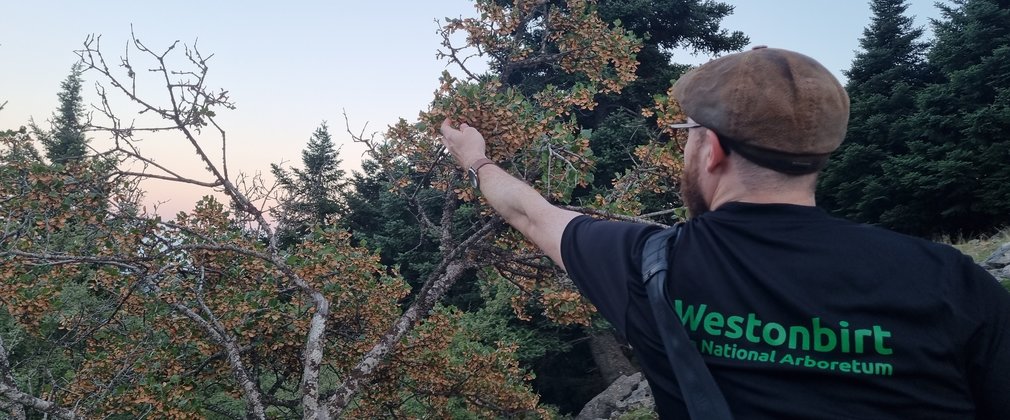
In September 2024 a team from Westonbirt travelled to collect seeds in mainland Greece on a nine-day expedition, covering an astonishing 3,100km in search of precious maple seeds.
As Westonbirt is the home of the National Collection of maple species, we are always looking to increase its value for research, conservation and education, and sourcing high quality seeds from the wild is crucial to these efforts.
Greece is home to nine species of Acer, including field maple (Acer campestre), Norway maple (Acer platanoides) and sycamore (Acer pseudoplatanus), familiar to us in the UK. We set out with the goal of collecting from and recording populations of all nine Greek maple species to increase their genetic representation here at Westonbirt.
After much searching, we managed to collect all but one of our targets, making 18 collections in total of nine taxa (species and subspecies).
(Pictured above: Dan Crowley collecting seed from Acer sempervirens on Mt. Parnon. Credit Rosie Anderson.)

Finding Queen Amalia's maple (Acer hyrcanum subsp. reginae-amaliae) on Mt. Parnon and Mt. Taygetos in the Peleponnes was particularly special. This delicate, shrub-like maple, pictured left) has the smallest leaves of all Acer and evolved to grow in picturesque and exposed rocky clearings at high elevations. Unfortunately, we saw evidence of extensive grazing by herds of goats and of the 25 or so trees we found, only three had seed which had survived.
Perhaps our most impressive collections were field maple and sycamore from Mt. Olympus, home of the Greek Gods. Nearby, we were also able to see horse chestnut (Aesculus hippocastanum) in its natural habitat, a far cry from the parks and gardens where it is often found in the UK.
The seeds are now in the care of our brilliant propagation team at Westonbirt, who will sow them in spring 2025, to be planted out in the collection within the next few years.
Duplicate collections of the seed will also be banked in Greece, with plans for ex situ plantings at a Greek Forest Research Institute site.
In the case of Queen Amalia's maple, which is rare in the wild and in cultivation, monitoring the trees we grow will help us to understand how to maintain ex situ back up collections within the UK. Material from some of the most southerly populations of field and Norway maple, and sycamore, may also prove valuable for researchers looking to see how they respond to future climatic changes. In addition, observations of the trees in their natural habitats, and their current threats will help to inform updated conservation assessments in the future.

We are very grateful to The Friends of Westonbirt Arboretum, for their ongoing support for our tree conservation work, and to our host from the Greek Forest Research Institute, Dr. Fotios Xystrakis, for his support and guidance during the expedition and to the researchers who kindly shared their field data.
